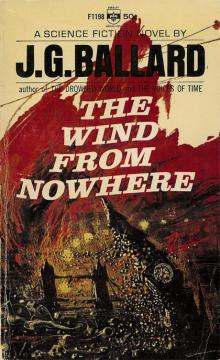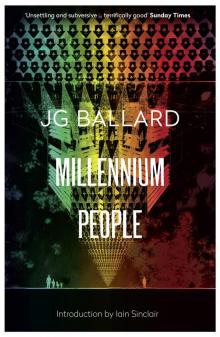- Home
- J. G. Ballard
Super-Cannes Page 15
Super-Cannes Read online
Page 15
Madame Cordier and Madame Ménard, the chauffeurs’ widows, were cut from plainer cloth. We met as arranged in Madame Cordier’s second-floor apartment, shielded from the sea by the coiled extrusions of yellow plaster that formed the balcony railings. The widows were in their mid-forties, watchful and circumspect women with faintly north African features, the daughters, I guessed, of pied-noir parents who had left Algeria in the 1960s.
They were dressed in black, almost certainly for my visit. On the telephone Madame Cordier had spoken in a halting English, no doubt learned from her dead husband, strong on traffic and parking tips, and assumed that I was a member of the Eden-Olympia inspectorate. Seeing my casual sportswear, she warily shook my hand, suspecting that the finance department at Eden-Olympia had made an unwise lunge into informality.
Fortunately, Philippe Bourget, the brother of the third murdered hostage, was also present. A slim young man with the pensive air of a doctoral student, he taught at a lycée in Mandelieu and was a fluent English speaker. He had driven to Port-la-Galère on the Mobylette cooling itself in the downstairs hallway.
Trying to ignore the Parisian chatter below the balcony, I expressed my deep regret over the tragedy. Then, deciding to jump in with both feet, I said to Bourget: ‘Please explain that my wife is a doctor at Eden-Olympia. We were close friends of David Greenwood.’
The women’s chins rose, and I expected a show of hostility. But they nodded without emotion. Madame Cordier, a tall and strong-faced woman, beckoned me to a chair, and then slipped away to prepare tea. Madame Ménard, a more placid and reserved figure, watched me with a slowly waking smile, her hands quietly gesturing to each other.
‘I’m glad,’ I said to Bourget. ‘I was afraid they might not want to see me.’
‘They know you weren’t involved.’ Bourget studied me, as if estimating my likely sympathies and intelligence. ‘You and your wife were in England at the time?’
‘Thankfully. We arrived in August. The longer we’re here the stranger everything seems. It’s impossible to believe that Dr Greenwood shot your brother.’
‘I agree.’ Bourget spoke matter-of-factly. ‘Does that surprise you?’
‘It does. Coming from you, it counts for something. Are you saying Greenwood may not have killed his victims?’
‘Not exactly. He killed the first seven who died. Sadly, there’s no doubt about that.’
Madame Cordier arrived with her tea tray. The widows turned to gaze at me, their faint smiles floating above the scent of camomile.
‘What about the hostages?’ I asked Bourget. ‘Your brother and the two husbands? Did he …?’
‘Kill them?’ Bourget hesitated, one hand touching the air as if searching for a blackboard. ‘It’s hard to decide. Perhaps not.’
‘What makes you doubt it?’
‘It’s a question of character.’
‘You don’t think Greenwood could have shot three men in cold blood?’
‘It’s unlikely. Still, we have to accept the court’s decision.’ He shrugged forbearingly, and stared at a framed photograph of Monsieur Cordier on the mantelpiece.
‘Did you meet Greenwood?’ I asked him.
‘No. But my brother often spoke of him. He was an engineer at the TV centre. Greenwood sometimes made health-and-safety broadcasts.’
‘He knew Greenwood?’ Without thinking, I handed my teacup back to Madame Cordier. ‘I thought Greenwood seized the hostages at random. What about the husbands? Had they met him?’
‘Yes.’ Sitting forward, Madame Ménard spoke up strongly. ‘Pierre met him many times. Five, six, more times …’
‘And Georges.’ Madame Cordier nodded vigorously. ‘They saw him together.’
‘At the clinic?’ I asked. ‘Dr Greenwood was examining them?’
‘No.’ Madame Ménard spoke in precise tones. ‘Not the clinic. At the Capitol.’
‘The Capitol? Is that an office building?’
‘It’s a bar in Le Cannet.’ Bourget stared hard at the two women, showing his disapproval of these unnecessary confidences. Before they could speak again, he added: ‘He advised them in a dispute with the personnel department.’
‘With the employment law,’ Madame Ménard explained. ‘He helped them at Eden-Olympia.’
Bourget pretended to search for his cycle clips. ‘There was a disagreement over evening work. They were expected to drive for too many hours.’
‘Pressure was put on them? They were threatened –?’
‘With dismissal.’ Bourget’s voice expressed his distaste. ‘Dr Greenwood intervened, and the hours were reduced. They no longer had to drive in the evening.’
‘Evening …’ Madame Cordier mimicked the violent movements of a steering wheel. ‘Bad time in La Bocca.’
‘And Pierre,’ Madame Ménard agreed. She clapped her hands above the teacups, trying to picture a blur of colliding cars. ‘Not a good time …’
The women broke off into French, voices raised as they shared their indignation. Bourget beckoned me to the mantelpiece.
‘It was generous of Greenwood to intervene. In many ways he was a decent man. But we musn’t alarm them.’
‘I’m sorry.’ I watched the animated widows in their bombazine dresses, capping each other’s memories. ‘They don’t seem too alarmed. Did the husbands have any idea what Greenwood was planning?’
‘How could they?’
‘It would explain why he took them hostage.’ Before Bourget could stop me, I turned to the women. ‘Madame Cordier, it’s a very sad time for you and Madame Ménard. I don’t want to upset you. Do you remember everything that happened on May 28?’
‘Of course.’ Madame Cordier composed herself like a witness in court. ‘Please speak, Monsieur Sinclair.’
‘Did your husband say anything about Dr Greenwood on the day before? Had he found something suspicious?’
‘Nothing. Georges said nothing about Dr Greenwood.’
‘Pierre told me he had many clients that day,’ Madame Ménard interjected. ‘He left very early for work.’
‘Right. What time did he usually report to the transport office?’
‘Before eight o’clock.’
‘So it took an hour or so to get there?’
‘No.’ Madame Ménard covered her watch. ‘We lived in Le Cannet.’
‘A ten-minute drive? And when did he leave on May 28?’
‘Six o’clock.’
‘He gave himself nearly two hours? Madame Cordier – can you remember when your husband left home?’
‘The same time. We lived in Grasse. A few minutes before six.’
I was about to question the women further, but Bourget took my arm. Patiently but firmly, he drew me to the balcony.
‘They know nothing, Mr Sinclair.’ He spoke with school-masterly disapproval. ‘They have no idea why Dr Greenwood seized their husbands. All these questions make it difficult for them to forget.’
‘Are they trying to forget? It seems to me that …’
But I paid my respects to the widows, who came to the door to see me off. For a moment, as they smiled at me, they seemed sorry to see me go.
I followed Bourget down to the entrance hall. He released the lock on his Mobylette and wheeled it into the road. Despite my challenge to his supervisory role over the widows, I sensed that he was glad to hear my questions aired. Once away from the women, his manner became more friendly.
As we walked towards the Jaguar, I said: ‘They weren’t too upset?’
‘They needed to talk. Were you surprised by how warmly they spoke of Greenwood?’
‘Very surprised. How did your brother feel about him?’
‘Jacques admired him. They were due to testify together as witnesses to a traffic accident. Now the case will never be heard.’
‘Who was involved?’
‘A junior manager in the personnel department at Eden-Olympia. A car forced him off the road. Greenwood helped him in the minutes before he died.’
�
�Greenwood was in the car?’
‘No. He was passing in another vehicle. Along the coast road to Juan-les-Pins. Joyriders accelerate to dangerous speeds.’
‘And your brother?’
‘He was in the manager’s car. They were friends, and often went hiking together. It’s lucky that Greenwood was driving by.’
‘And quite a coincidence – though not the first.’ I was aware that Bourget was watching me, like a teacher with a promising pupil. Deciding to be frank with him, I said: ‘On May 28, Greenwood seized three hostages. Ten thousand people work at Eden-Olympia, but he picks the two chauffeurs, knowing he may have to kill them. These are men he’s helped, with wives dependent on them. He needs a third hostage, and somehow chose your brother, even though they are going to testify in court together …’
‘He picked people he knew,’ Bourget pointed out. ‘Perhaps it was easier to approach them, rather than complete strangers. He was very disturbed, Mr Sinclair.’
‘Even so.’ I looked back at Madame Cordier’s apartment, where the widows watched from the balcony. ‘The husbands lived within ten minutes of Eden-Olympia, but left almost two hours before they needed to check in for work. Why?’
‘Impossible to say. People behave in unexpected ways. My brother was an active member of the Green movement. One day he took up sport shooting. He had a game licence to hunt deer. We were amazed.’
‘When was this?’
‘In April, about a month before he died. He often went to the military range at Castellane. I still have his weapons and ammunition. How do you explain that?’
‘I can’t.’ We had reached the Jaguar, in the crowded car park beside the quay. ‘I’m trying to start the clock on May 28. What was your brother doing so early in the car park of the TV centre? The station doesn’t transmit programmes until six in the evening.’
‘Does it matter, Mr Sinclair?’ Bourget put a hand on my shoulder, noticing my limp and anxious that I was overtaxing myself. ‘Can I ask why you’re so involved? You didn’t really know Greenwood.’
‘Why do you say that?’
‘You’re very concerned, but for a different man. David Greenwood was not a victim.’
‘No … I’m not sure what he was.’ I looked at the crowded quayside, with its chic young yachtsmen and their girlfriends. ‘Port-la-Galère … it’s charming, in its way. A curious retirement home for two chauffeurs’ widows.’
‘Eden-Olympia supplied the apartments. And the pensions.’
‘I hope they’re generous. Port-la-Galère looks rather fashionable.’
‘With a certain class of Parisian.’ Bourget helped me into the driver’s seat, clearly relieved that I was about to start the engine. ‘People come here to take cocaine and sleep with each other’s wives.’
‘Hardly a place for grieving widows? At the same time, there’s not much danger of them talking to the wrong people. Did Eden-Olympia offer you compensation?’
‘Naturally. It was substantial.’
‘And you accepted?’
‘Mr Sinclair …’ Bourget smiled to himself and patted the roof of the car, as if urging the Jaguar to take me back to the corniche road. With his cycle clips and Mobylette he looked like a French trainspotter, but I sensed that he had thought through Eden-Olympia’s involvement in his brother’s death and had a larger grasp than I did of the tragedy that surrounded David Greenwood. ‘The compensation …? I handed it to my brother’s former wife. It waits in trust for their son. Eden-Olympia looks after everything, Mr Sinclair.’
17
Refuge at La Bocca
PORT-LA-GALÈRE AND ITS secrets fell behind me as I climbed the steep incline to the coastal road. The guards at the rustic checkpoint logged the car’s numberplate into their mobile radios, waiting patiently as I fought the transmission system for possession of second gear. They were dressed in the chocolate-coloured uniforms favoured by supermarket security men. When they saluted, it struck me that this would be the chosen costume of any future army ordered to pacify a civilian population, reminding it of happier days spent in the confectionery aisles.
As I drove towards Cannes a light aircraft was taking off from the Cannes-Mandelieu airport near La Bocca. I pulled onto the verge, earning a rebuke from two elderly Frenchmen whose espadrilles I almost crushed. They slapped the Jaguar’s roof, but I let this pass, and watched the aircraft climb across La Napoule Bay. Layers of dust and humidity formed strata in the soft air, through which the hotels of the Croisette trembled like uneasy spectres, a dream about to collapse into itself.
I turned off the Cannes highway and followed the access roads that led to the small airport. Single-engined aircraft were parked in their green collapsible hangars, like the canopies of giant perambulators, and executive jets waited for their corporate fares by the passenger terminal. The dead chauffeurs, Cordier and Ménard, would have sat here in their limousines on countless days, staring through the wire fence and breathing the heady tang of aviation fuel. Already I was certain that they had not been David Greenwood’s hostages.
I circled the car park and stopped outside a small single-storey building like a general store in a mock-up of a Wild West frontier town. These were the offices of Nostalgic Aviation. The nose and cockpit section of a 1970s jet bomber was mounted on blocks beside the entrance, the equivalent of a cigar-store indian or a rusting cigarette machine. The showroom was filled with aviation memorabilia – helmets, parachutes and radio gear from the Cold War period, piston heads and propellers, several ejector seats and a radial engine.
The store had closed for the afternoon, and an almost tangible melancholy hung over everything, gathering the same dust as the model aircraft strung from the ceiling, the same sediment of past time that fell from the memories of old pilots and cloaked this miniature museum. The gyrocompasses and Strategic Air Command fuselage art – ‘SAC Time’, with naked blonde and priapic nuclear bomb – were fossils embedded in the past, like my old Harvard in the hangar at Elstree, as distant from the executives boarding the Nice shuttle as trilobites encased in prehistoric shale.
I stepped into the Jaguar, another rolling museum of itself, left the airport and drove into the industrial suburb of La Bocca. As the wheels struck the disused railway lines embedded in the road I remembered another dream that had died here, within earshot of the aircraft that patrolled the beaches of Cannes and Juan-les-Pins, advertising the discount furniture sales and speedboat auctions that helped to define the future of the new Côte d’Azur.
The children’s refuge at La Bocca, to which David Greenwood had devoted so much time, lay between the freight depot of the SNCF and a cluster of run-down tenements that offered temporary housing to Maghrebian workers. The two-storey building had gothic windows and a steeply pitched roof, and was the schoolhouse of a teaching order of African nuns. The dozen nuns, black sisters from former French colonies, had welcomed Greenwood’s offer to provide medical care for the girls in their charge. After May 28 the municipal authorities had closed the refuge, and the twenty girls were now in foster homes.
‘It was unsuitable for them to stay,’ Sister Émilie, a middle-aged nun from Dahomey, explained as she unlocked the doors and led me into the schoolhouse. ‘Journalists came every day, television cameras, even tourists …’
‘I understand. It would be dangerous for them.’
‘Not for the girls. You never had daughters, Mr Sinclair? You can control one thirteen-year-old. Two girls control each other. But twenty? Impossible. No man would be safe.’
The girls, she explained, were orphaned or abandoned daughters of migrant workers, and keenly interested in the bright lights of the Croisette. The dayroom on the ground floor was furnished with lumpy sofas and chairs, armrests scorched by cigarette burns. A crucifix hung from the wall, along with a Raphaelesque reproduction of the Saviour’s undernourished face and uplifted eyes, the image of a tubercular sexual fanatic that must have appealed to the girls who lay around gossiping and smoking their cigarettes.
‘Such kind people. They gave everything and took nothing. In the end …’ Sister Émilie clapped her hands, as if the multiple killings had been an inexplicable accident.
‘Did Dr Greenwood get on with Dr Serrou?’
‘Were they … intimate?’ Sister Émilie paused on the creaking stairs. ‘No. Anyway, not here. They didn’t ask for my permission. Dr Greenwood was very young, and very tired.’
‘There were no disagreements? Over running the refuge?’
‘Never. Busy people have no time to disagree. They were committed to their work.’
The dormitory on the second floor had been divided into barrack-style cubicles, each with three beds. The mattresses were bare, strewn with old scent bottles, broken mobile phones and music CDs.
Sister Émilie stared patiently at the debris, clearly eager to sweep everything into the nearest rubbish bin.
‘The police told me to touch nothing. So …’
‘Maybe the girls will come back one day?’
‘It’s possible.’ The prospect seemed to cheer her. ‘Your wife is a doctor, Mr Sinclair?’
‘A paediatrician, like Dr Greenwood.’ Embarrassed by the nun’s hopeful gaze, I could only say: ‘She has many responsibilities …’
I opened the wooden lockers behind the beds, filled with a clutter of shoes and spent cosmetics. From a peg hung a miniskirted cocktail dress with zebra stripes, an electric eyesore that could only have been worn within the lurid imagination of a twelve-year-old. On the shelf below was a pair of fishnet tights.
‘Those girls …’ Sister Émilie averted her gaze. ‘They had so many clothes.’

 High-Rise
High-Rise The Drowned World
The Drowned World The Unlimited Dream Company
The Unlimited Dream Company Running Wild
Running Wild The Day of Creation
The Day of Creation The Wind From Nowhere
The Wind From Nowhere The Complete Short Stories, Volume 2
The Complete Short Stories, Volume 2 Concrete Island
Concrete Island Empire of the Sun
Empire of the Sun The Kindness of Women
The Kindness of Women Vermilion Sands
Vermilion Sands Super-Cannes
Super-Cannes Millennium People
Millennium People The Complete Stories of J. G. Ballard
The Complete Stories of J. G. Ballard Crash
Crash The Drought
The Drought The Atrocity Exhibition
The Atrocity Exhibition The Complete Short Stories: Volume 1
The Complete Short Stories: Volume 1 Miracles of Life: Shanghai to Shepperton: An Autobiography
Miracles of Life: Shanghai to Shepperton: An Autobiography Rushing to Paradise
Rushing to Paradise Chronopolis
Chronopolis Cocaine Nights
Cocaine Nights High Rise (1987)
High Rise (1987) The Complete Short Stories
The Complete Short Stories The Day of Creation (Harper Perennial Modern Classics)
The Day of Creation (Harper Perennial Modern Classics) The Crystal World
The Crystal World